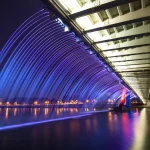When Saudi Arabia hosted its first Formula 1 Grand Prix in December 2021 at the Jeddah Corniche Circuit, it marked the beginning of a new era. It was the first time the Kingdom welcomed the world’s most prestigious motorsport series, and the race instantly became a symbol of ambition, progress, and transformation. What started as a debut event has now become a flagship fixture on the F1 calendar, one that reflects Saudi Arabia’s growing influence in sports, business, and global affairs.
A Strategic Entry into Global Sports
Saudi Arabia’s entrance into Formula 1 marked a significant milestone in its growing investment in international sports. The Jeddah Corniche Circuit, often described as the fastest street circuit in F1, brought global attention to the Kingdom. The race attracts millions of viewers worldwide and brings thousands of visitors to Saudi Arabia each year, boosting its tourism sector and reinforcing its role as a destination for world-class events.
According to the Saudi Ministry of Tourism, international arrivals in Saudi Arabia reached 27.4 million in 2023, making it one of the fastest-growing tourism markets in the world. High-profile events like Formula 1 have played a direct role in driving this growth, showcasing Saudi Arabia not only as a cultural and religious destination but also as a hub for entertainment and sports.
Driving Economic Diversification
The economic impact of Formula 1 in Saudi Arabia extends far beyond ticket sales. Each Grand Prix generates substantial revenue streams through hospitality, media rights, sponsorships, and related business opportunities. The sports economy is estimated to contribute around 1.5 percent of Saudi Arabia’s GDP by 2030, and motorsports are becoming a central pillar of that growth.
Local businesses also benefit, with increased demand for hotels, restaurants, transport services, and retail. In addition, the Kingdom’s investment in infrastructure around the Jeddah Corniche Circuit and the upcoming Qiddiya City circuit reflects a long-term strategy to embed motorsport and related industries into the national economy.
Building Global Soft Power
Beyond economics, Formula 1 has become an effective tool of global soft power for Saudi Arabia. The country is using its presence on the F1 calendar to reshape perceptions and project a new image to the world one that blends modernity with tradition. The spectacle of the race under the lights of Jeddah, broadcast to millions worldwide, positions Saudi Arabia as a confident and dynamic nation.
This strategy is not limited to Formula 1. Investments in football, boxing, and golf also contribute to building a diverse sports portfolio that strengthens Saudi Arabia’s influence on the global stage. The Formula 1 project, however, stands out due to its scale, visibility, and alignment with the Kingdom’s vision of hosting world-class events.
Opportunities for Youth and Innovation
Saudi Arabia is a young nation, with over 60 percent of its population under the age of 35. Formula 1 serves as more than a spectacle for this demographic it inspires new aspirations. Programs around STEM education, motorsport engineering, and event management are beginning to take shape, creating pathways for young Saudis to participate in industries connected to F1 and beyond.
The focus on innovation is also evident in the design and operation of future circuits. The upcoming Qiddiya City track, expected to host races in the near future, will be integrated into a broader entertainment and cultural complex. This project highlights how F1 is part of a wider ecosystem that promotes creativity, technology, and sustainable urban planning.
A Catalyst for Transformation
The journey from the first lap in 2021 to today’s flagship events underscores how Formula 1 is not an isolated sporting initiative, but a catalyst for economic and social transformation. It aligns with Saudi Arabia’s Vision 2030 by supporting diversification, attracting foreign investment, and creating opportunities for citizens and businesses.
For companies, the Saudi Arabian Grand Prix represents both a case study and an opportunity. It demonstrates how global sports can fuel economic growth, enhance reputation, and connect local markets to international networks. It also shows how strategic investment in sports can serve as a platform for long-term development and global engagement.
Conclusion
Formula 1 in Saudi Arabia has quickly moved beyond the racetrack to become a powerful symbol of change. From stimulating tourism and local business activity to reshaping global perceptions and empowering youth, the Kingdom’s F1 journey reflects the broader ambition of a nation in transformation. What began as a first lap in Jeddah is now steering Saudi Arabia toward a flagship role in the global sports economy, with implications that extend far beyond the finish line.





